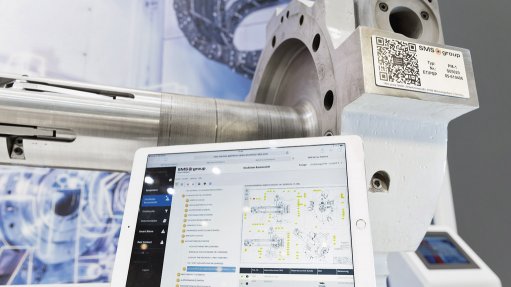
DIGITAL SALES Electronic spare parts catalogue in an eService module, which would be used by sales departments as digital tools to facilitate pricing and delivery transparency
Efficient plants, machinery and services solutions company SMS group has developed strategies to promote digitalisation in the steel industry, in light of Internet 4.0, digitalisation, Internet of Things (IoT) and cloud computing becoming dominant themes in the industry.
According to SMS group, Industry 4.0 refers to an ongoing process of capturing an entire network of value creation. It is made up of the vertical (internal) and horizontal (from supplier to customer) value creation chain, and will eventually lead to a fundamental transformation of both. “Everyone taking part in the value creation network will feel the change.”
Industry 4.0 also refers to the current trend towards digitalisation, the real-time exchange of data, and the accessibility of data by humans and machines, in the manufacturing process, within the value creation network. This encompasses techniques that enable the IoT and the Internet of People.
It also involves converging actual and nominal data of the mechanical equipment, functions and process through sensors, automation systems and software, and using networked sensors and mobile computing capacities in embedded systems. These systems are cloud networked, allowing for relevant information to be processed in an individualised way, in real time, and to be made available to humans and machines at any place and time.
Internet 4.0 includes the expansion and upgrading of automation and production control systems by introducing data analytics such as Big Data analysis and artificial intelligence, which enhance functionalities such as self-optimisation, self-configuration, self-diagnosis, pattern recognition and intelligent support systems for staff.
It also has the capacity for cyber physical systems (CPS), which are able to make autonomous decisions and collaborate on par with staff. This being said, SMS group urges that maximum attention be paid to the safety and protection of the needs of employees, processes and machines.
Moreover, SMS group notes that digitalisation is not a new concept, as Industry 4.0 has been present in companies in certain areas, without calling it ‘Industry 4.0’. As of 2000, SMS group had engaged in the development of virtual techniques, or virtual and augmented reality, as well as related basis technologies, such as interactive real-time visualisation and multimodal interaction.
Challenges
Meanwhile, the group notes that, with increased technological advances and development come challenges, many of which are experienced by industries other than steel but related to steel. Securing steel’s market position as a competitive material with versatile properties, as well as the ability to fulfil future demands, are important challenges that must be overcome for the industry to stay relevant and important.
The steel industry also needs to balance safeguarding competitiveness through lean processes and cost structures, while simultaneously ensuring that resources are used sparingly. There is pressure in the steel industry to consistently achieve top product quality and high yield, and to maximise plant performance, in conjunction with minimised maintenance and low capital lock-up.
Flexible production planning with varying and sometimes small batch sizes, as well as timely deliveries, is another hurdle that must be accomplished under ever-changing conditions, such as varying raw materials costs, energy challenges, human resources management, and changing rules, such as environmental regulations or modified legal standards.
A ‘smart steel factory’ will result in more sustainable and value-adding processes and is characterised by SMS group as a network of activities performed by man and machine in dynamic production processes, which will optimise automatically in real time, and take the complete value chain into account.
The Digital Workshop
SMS group has recognised that multidisciplinary collaboration is important, which prompted it to develop what is called the ‘digital workshop’. The digital workshop functions as a working and communication platform for multidisciplinary collaboration when dealing with tasks that involve different disciplines.
The digital workshop makes use of the native data and data exchange formats available in the three-dimensional computer- aided design and drafting systems used in engineering departments, linking simulation data with actuation of steel plant components and movements of products.
At present, virtual technologies are used as tools to back planning and design, and are applied in interactive product presentations used in sales departments, integration tests as part of the project implementation process, or virtual technologies used by service departments for training purposes.
However, involving the customer as part of a virtual, multidisciplinary working environment, shared by many users, results in effective coordination and agreement process, minimising potential corrections and saving project time and costs.
Having discussed digitalisation’s technological aspects, SMS group adds that Industry 4.0 has consequences on the integral processes of a company, with fundamental effects on existing processes and business models. SMS group sees digitalisation “more as an evolution than a revolution”.
Change is inevitable, and is expected to take place primarily in the areas of production, maintenance and quality assurance, before moving on to other related industries. Vital factors in enabling this change include embedded systems, digital service platforms, the successful implementation of real-time data networks, and the ability to make the best use of Big Data analytics performance capabilities and cloud computing, in order to promote the employment of self-optimising, autonomous process control systems. “Digitalisation will provide entirely new opportunities for both steel producers and plant manufacturers.”
SMS group forecasts that these new opportunities will lead to more intensive cooperation between manufacturing plant suppliers and customers, concluding that the implementation of digital solutions are commercially rewarding for both sides.